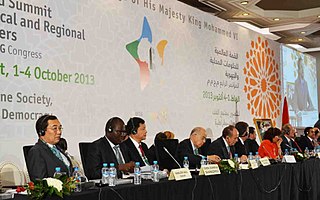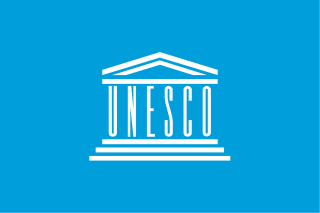
Yehudi Menuhin, Baron Menuhin,, was an American-born British violinist and conductor who spent most of his performing career in Britain. He is widely considered one of the great violinists of the 20th century. He played the Soil Stradivarius, considered one of the finest violins made by Italian luthier Antonio Stradivari.

Michail "Mikis" Theodorakis was a Greek composer and lyricist credited with over 1,000 works.

The Yehudi Menuhin School is a specialist music school in Stoke d'Abernon, Surrey, England, founded in 1963 by violinist and conductor Yehudi Menuhin. The current director of music is the British classical pianist Ashley Wass. The school is one of the five established musical schools for school-age children in the United Kingdom, along with Chetham's School of Music, Wells Cathedral School, the Purcell School and St. Mary's Music School, Edinburgh. It is mainly funded by the Department for Education's Music and Dance Scheme, by philanthropic foundations, by donations and bequests from individuals, and by regular support from the Friends of the Yehudi Menuhin School.
Kam Ning is a violinist and daughter of the violinist-composer Kam Kee Yong (甘琦勇), and grandchild of Kam Beng Soo and Ooi Kooi Aun. Born in Singapore in 1975, she was given violin lessons at the age of six by the elder Kam, and had her early education at the Methodist Girls' School.

Oumou Sangaré is a Grammy Award-winning Malian Wassoulou musician of Fulani or Fula descent. She is often referred to as "The Songbird of Wassoulou". Wassoulou is a historical region south of the Niger River, where the music descends from age-old traditional song, often accompanied by a calabash.

The World Book Capital (WBC) is an initiative of UNESCO which recognises cities for promoting books and fostering reading for a year starting on April 23, World Book and Copyright Day. Cities designated as UNESCO World Book Capital carry out activities with the aim of encouraging a culture of reading in all ages and sharing UNESCO's values. The nomination does not provide a financial prize.

José Antonio Abreu Anselmi was a Venezuelan orchestra conductor, pianist, economist, educator, activist, and politician best known for his association with El Sistema. He was honored with the 2009 Latin Grammy Trustees Award, an honor given to people who have contributed to music by the Latin Academy of Recording Arts & Sciences.
Chen Jiafeng is a Chinese violinist. He was the first prize winner in the 2003 International Competition for Young Violinists K. Lipinski and H. Wieniawski and the second prize winner in the 2008 International Yehudi Menuhin Violin Competition, and the second prize of the International Jean Sibelius Violin Competition in Helsinki.

The Yehudi Menuhin International Competition for Young Violinists is an international music competition for violinists under the age of 22. It was founded by Yehudi Menuhin in 1983 with the goal of nurturing young violinists. In its early years, the competition took place in Folkestone on the south coast of England. Since 1998, it has been held biennially in different cities around the world. Several of the competition's past laureates, including Julia Fischer, Tasmin Little, and Nikolaj Znaider, have gone on to major international careers.

United Cities and Local Governments (UCLG) is an umbrella international organisation for cities, local and regional governments, and municipal associations throughout the world that is concerned with representing and defending the interests of local governments on the world stage.

The United Nations Educational, Scientific and Cultural Organization (UNESCO) is a specialized agency of the United Nations (UN) with the aim of promoting world peace and security through international cooperation in education, arts, sciences and culture. It has 194 member states and 12 associate members, as well as partners in the non-governmental, intergovernmental and private sector. Headquartered in Paris, France, UNESCO has 53 regional field offices and 199 national commissions.
Richard Albert Letts is an music advocate and administrator.

Culture 21, also known as Agenda 21 for culture, is a program for cultural governance developed in 2002–2004 and organized by United Cities and Local Governments.

Paloma O'Shea Artiñano, 1st Marchioness of O'Shea is a pianist, patron of the arts, founder and current president of the Reina Sofía School of Music, and founder and president of the Albéniz Foundation, which organizes the Paloma O'Shea Santander International Piano Competition in Santander, Spain.
The European Music Council (EMC) is a regional group of the International Music Council (IMC) representing Europe. It was established in 1972 as the 'European regional group of the IMC' and was renamed the European Music Council in 1992. The IMC was founded by UNESCO in 1949, and is, today, a non-governmental organisation (NGO), which still retains formal relations with UNESCO. Until 2000 the secretariat was based in Aarau, Switzerland, and is now in Bonn, Germany.

Jorge Chaminé is a Portuguese operatic baritone.
Live Music Now is a charity working and campaigning to create inclusive, measurable social impact through music.
Fatou Jagne Senghore also known as Fatou Jagne Senghor is a Gambian Jurist, human rights advocate, women's rights and free expression activist. She is well known for her work in human rights in West Africa especially in The Gambia and Senegal She earned the nickname of "Senegambian Iron Lady" for her efforts defending human rights in The Gambia under the autocratic leadership of Yahya Jammeh.
Bacem Anas Romdhani is a Tunisian-British violinist. He lives in London. He plays on a contemporary violin made by Andreas Hellinge made specially for Lord Yehudi Menuhin.











